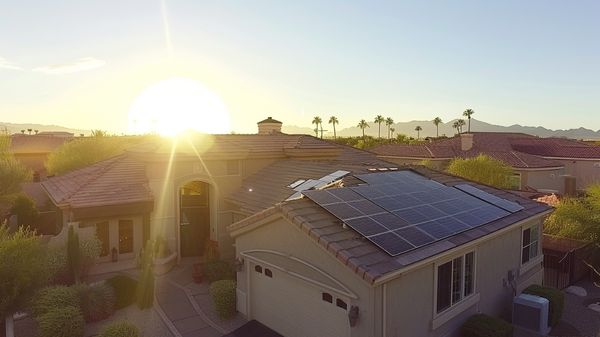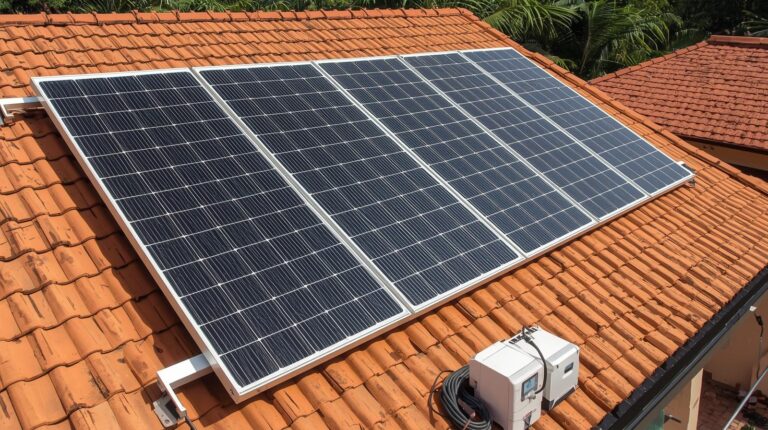To install a 15kW solar system, you can expect to spend between $30,000 and $45,000 on average. The final cost varies depending on factors like location, quality of equipment, and installation expenses.
It’s important to gather quotes from multiple installers to secure competitive prices. Equipment costs greatly impact the total expenses, alongside labor, permits, and inspections. Various financing options are available, such as solar loans or power purchase agreements, to make the investment more manageable.
Understanding the breakdown of costs, including solar panel types and inverter options, aids in informed decision-making for projected long-term energy savings.
| # | Preview | Product | Rating | Price | |
|---|---|---|---|---|---|
| 1 |

|
ExpertPower 15KWH 5400W 48V Solar Power System Kit | LiFePO4 48V 300Ah Battery, 5400W Solar... | $6,999.99 | Buy on Amazon | |
| 2 |

|
16KWH 10KW Hybrid Solar System Complete Kit 10PCS*550W Solar Panel (5500W) + 1Set 48V 10KW Split... | $8,299.99 | Buy on Amazon |
Key Takeaways
- Average cost ranges between $30,000 to $45,000, influenced by location and equipment quality.
- Gathering multiple installation quotes is crucial for competitive pricing.
- Equipment costs significantly impact total expenses of a 15kW solar system.
- Installation costs include labor, equipment, permitting, and inspection.
- Compliance with local regulations is essential to avoid regulatory issues.
Average Cost of 15kW Solar System
The average cost of a 15kW solar system typically ranges from $30,000 to $45,000, depending on various factors such as location, quality of equipment, and installation costs.
When looking into solar system pricing, it’s crucial to gather multiple installation quotes to guarantee you’re getting the best deal. By exploring different options, you empower yourself to make an informed decision that aligns with your budget and sustainability goals.
Remember, the cost of a solar system is an investment in your future and the environment. Seek transparency from solar providers, ask questions, and compare quotes diligently.
Liberation comes from understanding your choices and making decisions that resonate with your values. Embrace the journey of exploring solar energy options and take charge of your energy independence.
With the right information and mindset, you can navigate the domain of solar system pricing confidently and liberate yourself from traditional energy constraints.
Factors Affecting Solar System Cost
Choose a larger solar system size, and you’ll likely notice a significant bump in the overall cost. Several key factors can influence the cost of a solar system installation:
- Solar Panel Efficiency: Higher efficiency panels may cost more upfront but can lead to greater long-term savings by generating more electricity.
- Installation Location: Sunlight availability and the complexity of installation at your location can impact costs.
- Maintenance Costs: Regular maintenance guarantees peak system performance and may vary based on the type of system installed.
- System Warranty: Longer warranties may come with a higher initial cost but provide more extended protection and peace of mind.
- Energy Storage: Adding battery storage for excess energy can increase costs but offers energy independence and backup during outages, with systems like the SunPower Battery providing such capabilities.
- Local Regulations: Permitting requirements and regulations can affect installation costs.
- Grid Connection: Costs may vary based on the proximity to the grid and connection fees.
- Market Trends: Changing market dynamics can impact the overall cost of solar systems.
Consider these factors alongside installer reputation and financing terms to make an informed decision.
Equipment Expenses Breakdown
When considering the expenses involved in setting up a solar system, it’s important to break down the costs associated with the equipment needed for the installation.
The two main components that greatly impact the cost of a solar system are the solar panel types and inverter options. Here’s a breakdown of the expenses related to these key elements:
Solar Panel Types:
- Monocrystalline Panels: Known for their high efficiency but come at a higher cost.
- Polycrystalline Panels: Slightly less efficient than monocrystalline panels but more budget-friendly.
- Thin-Film Panels: Less efficient but more flexible and lightweight, suitable for certain installations.
- A proper assessment of energy needs can help determine the most suitable type of solar panels for affordable efficiency.
Inverter Options:
- String Inverters: Cost-effective but can be affected by shading issues.
- Microinverters: Higher initial cost but offer individual panel optimization and better performance in shaded conditions.
Considering these equipment expenses is important when planning for a 15kW solar system to make sure you choose the right balance between cost and efficiency.
Installation Costs Overview
For a thorough understanding of the overall expenses involved in setting up a 15kW solar system, it’s crucial to explore the installation costs overview.
The installation process of a 15kW solar system involves various components that contribute to the overall cost. Here is an overview of the installation costs you can expect:
- Labor Costs: The largest portion of the installation expenses typically goes towards paying for the labor involved in setting up the solar system. This includes the wages for the technicians and installers who’ll be working on your project.
- Equipment Installation: Apart from labor costs, there are expenses associated with installing the solar panels, inverters, wiring, and mounting equipment. These costs cover the physical installation of the components onto your property.
- Permitting and Inspection: Additional costs may arise from obtaining permits for the solar installation and scheduling inspections to ascertain that the system meets all safety and regulatory requirements. It is important to ensure compliance with local regulations to avoid any regulatory issues during the installation process.
Financing Options for Solar Systems
When considering a solar system, you have various financing options available to make the investment more manageable. You can explore payment plans tailored to your budget, weigh the benefits of leasing versus buying outright, and take advantage of tax incentives and rebates to maximize savings.
Understanding these financing avenues can help you make an informed decision that aligns with your financial goals and sustainability objectives. Additionally, researching local incentives, such as government rebates, can further reduce the overall cost of your solar system.
Payment Plans Available
Considering investing in a solar system for your home? When it comes to financing options, there are various payment plans available to suit your needs and provide payment flexibility. Here are some ways you can make the cost of a 15kW solar system more manageable:
- Solar Loans: Many financial institutions offer loans specifically for solar installations, allowing you to spread the cost over a period of time with fixed monthly payments.
- Home Equity Loans or Lines of Credit: Using the equity in your home can be a cost-effective way to finance your solar system, often with lower interest rates compared to other options.
- Solar Leases: With a solar lease, you pay a fixed monthly amount to use the solar system without owning it. This can be a good option if you prefer not to purchase the system outright.
- Power Purchase Agreements (PPAs): With a PPA, a third party owns the solar panels and you pay for the electricity they produce at a predetermined rate, usually lower than your current utility rates.
Exploring these financing options can make going solar more accessible and affordable for your home.
Leasing vs. Buying
Opting to lease or buy a solar system is a crucial decision when considering financing options.
Leasing Benefits:
- Immediate Savings: Leasing requires little to no upfront costs, allowing you to start saving on your electricity bills from day one.
- Maintenance Included: With a lease, the responsibility for maintenance and repairs often falls on the leasing company, easing your burden.
- Flexibility: Leasing offers the flexibility to upgrade to newer, more efficient systems when your lease ends, ensuring you stay current with technology.
- Easy Approval: Leasing typically has lower credit score requirements compared to buying, making it accessible to a wider range of homeowners.
Buying Considerations:
- Long-Term Savings: Buying a solar system can lead to greater long-term savings as you own the system and benefit from reduced electricity bills.
- Increase in Home Value: Purchasing a solar system can increase the value of your home, providing a return on investment if you decide to sell.
- Tax Incentives: Buying may make you eligible for various tax incentives and rebates, further reducing the overall cost.
- Control and Ownership: Buying gives you full control over your system, allowing you to make decisions without restrictions from a leasing company.
Tax Incentives and Rebates
Exploring tax incentives and rebates for solar systems can greatly impact your overall investment in renewable energy. Taking advantage of federal incentives, state rebates, tax credits, solar deductions, and installation grants can make solar energy more affordable and financially attractive.
These financial benefits not only reduce the initial cost of installing a 15kW solar system but also contribute to long-term energy savings. By leveraging these incentives and rebates, you not only save money but also contribute to environmental benefits by reducing your carbon footprint.
Federal incentives and tax credits can considerably lower the upfront costs of installing a solar system, making it a more feasible investment. State rebates and installation grants further supplement these savings, enhancing the economic impacts of shifting to solar energy.
The combination of these financial incentives not only makes solar energy more accessible but also highlights the positive environmental and economic effects of utilizing renewable energy sources. By exploring these options, you can make a sustainable choice while also benefiting from substantial cost savings.
Return on Investment Analysis
When considering the installation of a 15kW solar system, understanding the Return on Investment (ROI) is essential. This analysis involves a breakdown of costs, calculation of the payback period, and a summary of the financial benefits.
Cost Analysis Breakdown
Let’s explore the Cost Analysis Breakdown for a 15kW solar system, focusing on the Return on Investment (ROI) Analysis. When considering the cost breakdown of a 15kW solar system, it’s crucial to investigate the specifics to understand the investment’s value.
Here’s a breakdown to help you make an informed decision:
- Solar Panel Types: Choose the right solar panel type based on efficiency, durability, and cost to maximize your ROI.
- Energy Savings: Calculate the projected energy savings over the lifespan of the system to gauge the long-term benefits.
- Installation Costs: Factor in installation expenses, including labor and equipment, to determine the upfront investment required.
- Incentives and Rebates: Explore available incentives and rebates to offset costs and enhance your ROI potential.
Payback Period Calculation
To assess the financial viability of investing in a 15kW solar system, calculating the payback period is essential.
The payback timeline refers to the duration it takes for the energy savings generated by the solar system to offset the initial investment cost. By determining this timeline, you can gauge how long it will take to recoup your investment and start realizing actual savings on your energy bills.
Calculating the payback period involves analyzing factors such as the upfront cost of the solar system, available incentives or rebates, ongoing energy savings, and any potential increase in property value.
Understanding these components will help you make an informed decision regarding the financial benefits of installing a 15kW solar system.
Financial Benefits Summary
Maximizing the financial benefits of investing in a 15kW solar system involves conducting a Return on Investment (ROI) analysis. By evaluating the long-term benefits and potential energy savings, you can make an informed decision regarding the financial impact of installing a solar system.
Here’s a breakdown to help you understand the financial benefits:
- Energy Savings: With a 15kW solar system, you can greatly reduce your monthly electricity bills, leading to substantial savings over time.
- Tax Incentives: Take advantage of available tax credits and incentives for solar installations, further lowering the overall cost of your system.
- Increased Property Value: Installing a solar system can boost your property’s value, providing a return on investment if you decide to sell your home in the future.
- Environmental Impact: Beyond financial gains, investing in solar energy contributes to a sustainable future by reducing your carbon footprint.
Analyzing these factors can help you see the tangible benefits of going solar beyond just the initial cost, ensuring a sound financial decision.
Conclusion
To sum up, the cost of a 15kW solar system can vary depending on factors such as equipment quality, installation complexity, and financing options. Remember, “you get what you pay for” when investing in solar energy.
Consider all the factors carefully and choose a system that offers the best value for your needs. With proper planning and research, you can enjoy the benefits of renewable energy while saving money in the long run.
| # | Preview | Product | Rating | Price | |
|---|---|---|---|---|---|
| 1 |

|
15KW Complete Offgrid Solar Kit - 32kWh OMO Freedom Lithium Battery + 15K Sol-Ark Inverter... | $29,939.00 | Buy on Amazon | |
| 2 |

|
ECO-WORTHY 10KW Output 9.36KWH Off Grid Solar System Complete Kit for Home:12pcs 195W Solar... | $5,299.99 $4,999.99 | Buy on Amazon |




